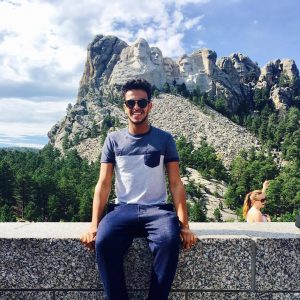My Semester in the U.S.
Mohammed Al Shammari (Bahrain), Minnesota State University – Mankato
In December 2015, I ended a big chapter in my life at an organization that I volunteered at for 3 and a half consecutive years, and was looking to jump at the next opportunity to grow and explore myself as well as the world around me. That was when I applied for the Global UGRAD Program. After the hard work I kept in my application and interview, I got selected to represent my country, Bahrain, at Minnesota State University, Mankato. Full of excitement, I began wondering what kind of experience it would be and what kind of challenges I would face and began to envision the kind of person

I would be at the end of the program, which made me more ecstatic.
In August of 2016, I landed in the U.S. and headed to my campus where I lived for the next four months. Settling in wasn’t the most challenging, but it wasn’t so easy either. I say it wasn’t very challenging because I stayed at the dorms, there were hardly any ‘housing’ related responsibilities I needed to take care of, such as electricity, rental, utilities, or food, seeing as I had a meal plan in the university dining hall. It took me three days to finally organize all my clothes and personal belongings in my tiny side of the room, waiting anxiously to meet my roommate for the first time. A week later, I walked into my room and saw my roommate, Brady, had already settled in. Within 15 minutes we decided to reorganize the entire room and change the way our beds were setup and the way our desks were placed. “This is great, we’re already agreeing and seeing eye-to-eye on so many things!” – I thought to myself. And that is how the rest of the semester went, when it came to my housing and roommate experience within the program.
The first day of classes was a week after I settled in. I was nervous. I thought I’d get different kind of looks and stares because I looked different than the rest of the people here. I was clearly foreign, and had heard that Americans are not adept at dealing with outsiders. This assumption or stereotype, you may call it, was all in my head and I was proven wrong time and time again. Every American I met greeted me with a big smile and welcomed me into their country. It didn’t stop there: they were also eager to learn more about where I come from, the Middle Eastern and Bahraini culture, as well as the Arabic language.
That was when I learned one of the most valuable lessons I learned while on the program: never generalize, or treat people based on stereotypes – don’t make any assumptions.
Fortunately, language was not a communication barrier for me in my experience. However, I did still somewhat struggle in some of my classes, specifically the ones that required online coursework.
Three of my 5 classes had online tests, assignments and quizzes. This was particularly challenging for me coming from a law college in Bahrain given that we never used online courses or platforms to submit our assignments. All our evaluation was based on essay-based tests that take place twice a semester, all relying on your memorization skills.
In the States, I didn’t always check the online student platform that the university used, and I found it really confusing when I noticed that my professor would put up notices and assignments online but never mention or talk about it in the classroom. I was hesitant… was this assignment just extra work to help us understand the subject better? Is it compulsory? Is it graded? When is it due?
Only when I missed a couple of assignments because of my hesitance and fear of asking questions and looking stupid in front of my classmates, did I learn to not depend on my tutor to tell us about the assignments he posts. I learned that it is the responsibility of the student to constantly check for homework and assignments, especially given the fact that the tutor will rarely ever bring it up in class and instead, would just wait for you to submit it online.
My experiences in the U.S. led me to many realizations; to always stop and reflect on myself and my personal growth. To always question my motives and actions. Am I trying to be a better version of myself from yesterday’s version? Is this the most I can grow? Is what I’m saying contributing positively into the conversation I’m having? Is it valuable?
I learned the power of reflection is undeniable when it came to growing as a person and being more self-aware. Understanding yourself is understanding your strengths and weaknesses. How to sharpen your strengths and overcome your weaknesses and the way to do that is to reflect on every small or big experience you go through in life, every conversation, every interaction. There’s always more to learn from people you engage with and from the situations you experience. How else would you know you are progressing and your mindset is changing towards the better?